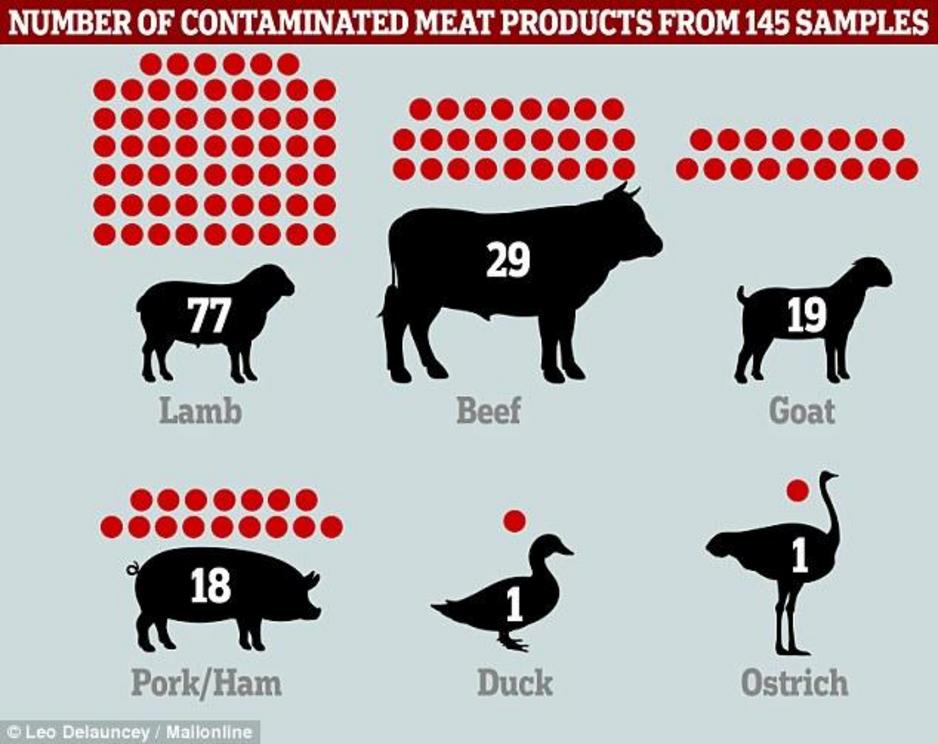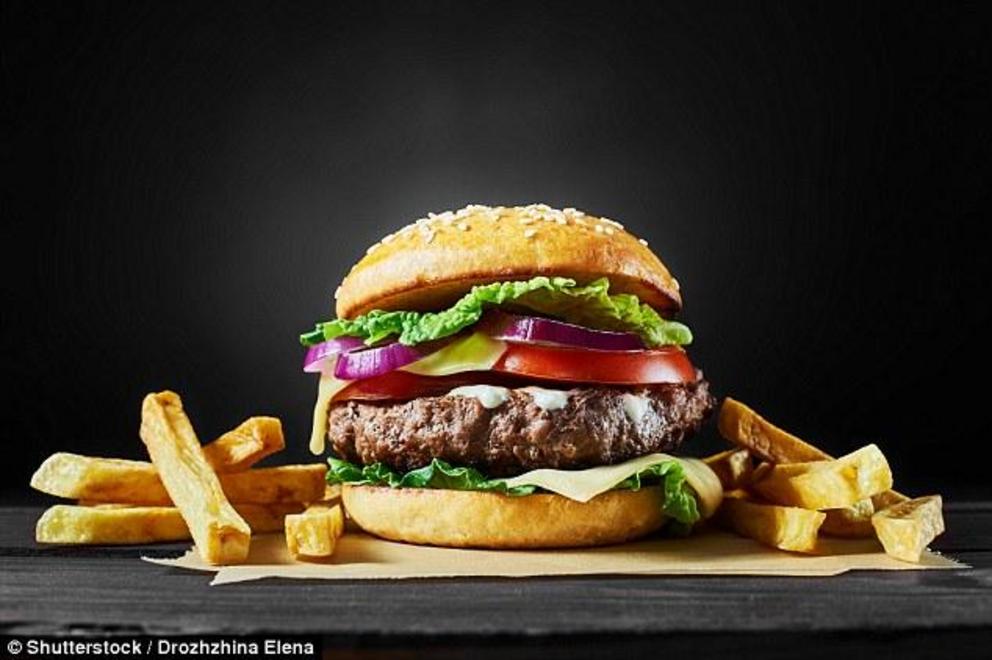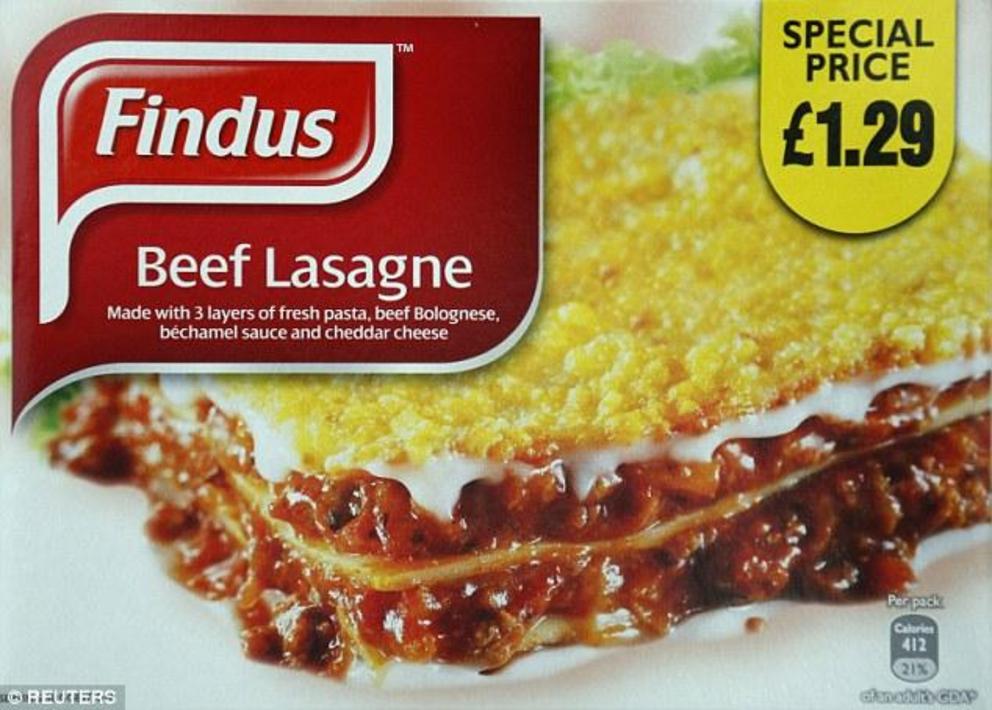Over fifth of meat in Britain's restaurants and supermarkets contains 'unspecified animal' DNA
Over a fifth of meat in British supermarkets and restaurants including sausages, burgers and pizzas contains 'unspecified meat' an alarming investigation has found.
In the second food contamination scandal to rock Britain in just five years, 145 items out of 665 tested in a Food Standards Agency (FSA) report contained animal DNA that was not listed on the packaging.
But the names of the 487 brands and shops implicated have not been revealed.
The results point to 'deliberate inclusion' of foreign meat, according to the FSA - possibly as part of a scam that stretches across the food sector.
The most highly contaminated items were fresh and cooked lamb products, with some curries and kebabs labelled as lamb made entirely from beef.
It follows the 2013 horsemeat scandal that shook Europe after horse DNA was found in several beef products sold on the continent.

Pictured are the meats that were contaminated with unspecified DNA. One-hundred-forty-five items out of 665 tested as part of a Food Standards Agency (FSA) report contained animal DNA that was not listed on the packaging
WHICH MEAT WAS CONTAMINATED WITH OTHER DNA?
The FSA found 145 of 665 food items were contaminated with other DNA.
Below are the number of items that were contaminated.
- Lamb: 77
- Beef: 29
- Goat: 19
- Pork/ham: 18
- Duck: One
- Ostrich: One
The British Food Standards Agency (FSA) found 145 items out of 665 that it sampled in 2017 consisted partly or wholly of unspecified meat, it reported.
The FSA said the results, accessed under a freedom of information request by the BBC, were consistent with 'deliberate inclusion'.
But the agency added that the tests had deliberately targeted operations suspected of 'compliance issues'.
They were 'not representative of the wider food industry', an FSA spokesman told MailOnline.
Around half of the 145 contaminated samples came from retailers, which included three supermarkets, 50 belonged to restaurants and 22 originated from food manufacturers.
Around 85 per cent of contaminated samples were sold by either butchers or takeaway businesses.
RELATED ARTICLES
- Could this be the return of the WOOLLY MAMMOTH?Scientists... Asteroids could be knocked TOWARDS Earth so miners can drill... Seal steak with a side of seagrass: Scientists discover the... Get ready for a gold rush in space: Mining asteroids could...
Some specimens showed DNA from as many as four different animals, while others contained no trace of the actual meat listed on the product label.
Supposed lamb items were most likely to contain traces of other animals' DNA, followed by beef and goat, while cow DNA was the most common contaminate.
Pig, chicken, sheep and turkey also featured frequently when not specified on packaging.

More than a fifth of meat tested in Britain last year contained DNA from animals not listed on the label, according to the BBC (stock image)
WHAT WERE THE WORST CASES FOUND BY THE FSA?
An ostrich mince product sold in Yorkshire was made entirely from beef.
A duck dished named 'bagalore' was 100 per cent lamb.
A lamb korma sold in Blackpool was made entirely of beef.
In Dudley, a curry restaurant sold a lamb passanda that was more than 60 per cent beef.
Pork sausages sold by small butchers in Durham and Northern Ireland contained undeclared beef and lamb.
Mince meat was the product incorrectly labelled most often, followed by sausages, kebabs and restaurant curries.
An FSA spokesperson told MailOnline that local authorities - which had procured the samples for the agency - were responsible for leading investigations and taking 'appropriate action'.
They said: 'The number of unsatisfactory samples is a result of this targeted approach where businesses which don't comply are sampled multiple times, and the figures are not representative of the wider food industry.
'Where problems are found, local authorities can consider appropriate action to protect customers and improve compliance, which may include a formal warning or taking enforcement action such as prosecutions or cautions.'
The European Union, which Britain is due to leave next March, toughened oversight of the food industry across the continent last year to prevent a repeat of a horsemeat scandal in 2013.
Millions of European consumers were shocked to learn then that a long list of supermarket items being passed off as beef or pork were in fact horsemeat.
WHAT WAS THE 2013 HORSEMEAT SCANDAL?
A scandal erupted in January 2013 after horse DNA was found in several beef products in Britain and Ireland.
Frozen food brand Findus was found to be selling a beef lasagna in several European countries, including the UK, which contained 60 per cent to 100 per cent horse meat.
A number of other companies selling ready-made foods were forced to admit that they had unknowingly sold beef products containing horse meat.

Frozen food brand Findus was found to be selling a beef lasagna in several European countries, including the UK, which contained 60 per cent to 100 per cent horse meat
As a result, supermarkets across the continent pulled millions of suspect food products like canned goulash and lasagna from their shelves.
The horse meat was reported to have originated from a slaughterhouse in Romania, which produced meat for a Dutch company.
Two Frenchmen and two Dutchmen were charged in March 2018 with 'organised fraud' after a three-year inquiry into the scandal.
Video can be accessed at source link below.
